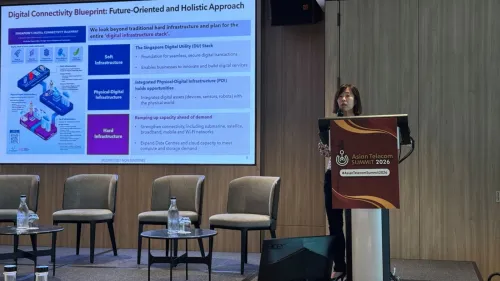Southeast Asian governments being reshaped by digital shift
Deloitte Consulting Southeast Asia Partner Cheong Chew Wai highlights the impact of digital transformation on government and public services.
The digital shift is revolutionising governments across Southeast Asia, making it necessary for public services to adapt to evolving needs.
In an exclusive interview with GovMedia, Cheong Chew Wai, Partner at Deloitte Consulting Southeast Asia, said governments are already embracing digital technologies, redefining public service delivery, decision-making processes, and citizen engagement.
“Over the years, we have seen that the focus has shifted from improving administrative processes and reducing paperwork to now using technologies such as cloud computing, data analytics, and AI to build connections between people, systems, and different government agencies, as well as to enable better decision making,” said Chew Wai.
Singapore, a regional pioneer in digital transformation, can be proof that digital transformation is not a new concept for governments in the region.
The city state has been at the forefront of adopting e-government initiatives, providing citizens with convenient access to a wide range of public services through digital platforms.
Its Smart Nation initiative further transforms areas such as healthcare, transportation, and businesses, seamlessly integrating technology into the fabric of society.
The recent global pandemic has also accelerated the adoption of digital technologies throughout the region, as citizens demanded more seamless and personalised services. To remain relevant and effective, public services must keep pace with the evolving needs of the population.
Chew Wai highlighted on three key benefits of digital transformation in the public services sector, beginning with back-office operations, including HR and finance. These departments have witnessed improved efficiency through automation and straight-through processing, enabling government agencies to save time and resources.
These savings that can be reinvested towards improving public services and driving innovation to address societal challenges.
Secondly, digital transformation has made services more accessible and personalised.
Touching on accessibility, Chew Wai said: “Today, many services are available online 24/7. Citizens can access information, submit applications, and engage with government agencies from the convenience of their homes or mobile devices.”
There is also more collection of data, sharing of data, and collaboration between government agencies. Chew Wai commented that “governments today are making strides in providing more personalized services, tailored to individual needs, fostering a more citizen-centric approach.”
Finally, data-driven decision-making has become possible due to advancements in digital systems. Governments can now collect, store, and manage data securely, breaking down barriers to data sharing and enabling evidence-based policymaking.
This data-driven approach fosters innovation and delivers better services to improve citizens’ lives.
However, whilst digital transformation brings numerous benefits, governments face several challenges during implementation.
Varying digital infrastructure and connectivity across the region can hinder progress, with rural areas in some developing countries lacking access to reliable internet connectivity.
Ensuring robust cybersecurity measures and compliance with data protection regulations is crucial to protect citizens’ data and maintain public trust.
“Navigating complex regulatory environments and legal frameworks when adopting new digital technologies can be challenging for governments in the region,” Chew Wai told GovMedia as he acknowledged certain difficulties the region faces in adapting new digital technologies, citing generative AI as an example.
Another significant hurdle is the digital skills gap.
Chew Wai said government employees must be willing to acquire the necessary digital competencies to effectively implement and manage digital initiatives.
To combat potential resistance to change, significant change management endeavours, and potentially organisational restructuring will have to be explored with the end goal of optimising the adoption of digital technologies.
Ultimately, digital transformation leads to more meaningful citizen engagement and participative governance in Southeast Asia, said Chew Wai.










